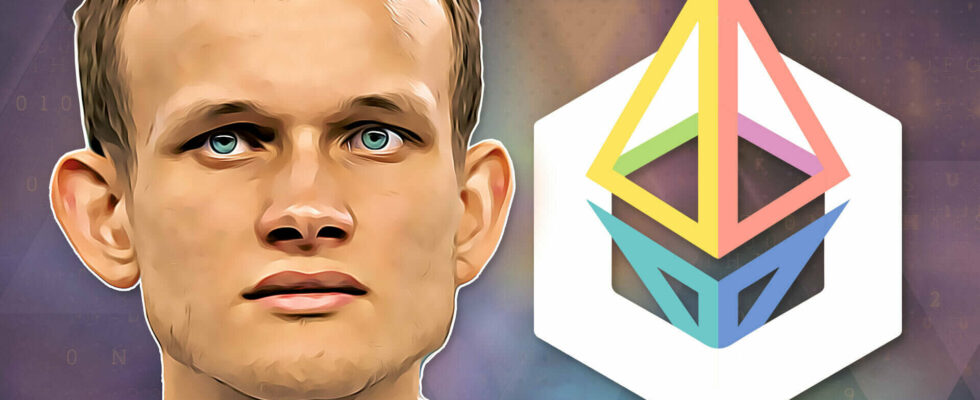Although by its very nature, Ethereum aims to evolve in the most decentralized and autonomous way possible, Vitalik Buterin as its co-founder retains an audible voice, strong authority and a significant impact on the evolutions of its creation. Armed with this authority, the person concerned takes up the pen today to warn of certain dangers that could weaken Ethereum, pushed beyond its natural limits by a tangled pile of functions and services that were not planned and poorly anticipated.
Ethereum under pressure, victim of its own success
THE blog post by Vitalik Buterin is particularly interesting, insofar as it arises in the wake of several epiphenomena concerning the two main crypto assets on the market: Bitcoin and Ethereum.
By evoking unplanned (or even non-compliant) uses on Ethereum, it obviously refers to the “Ordinals hype”, these “NFTs on Bitcoin”, sometimes denounced as a parasitic use of the network. And moreover, Buterin’s speech comes a few days after the multiple incidents impacting Ethereum’s consensus layerparalyzing for long minutes the validation of new blocks on the network.
Vitalik Buterin begins by making an observation regarding the swarming of decentralized applications (dApps) running on the consensus layer, in particular the oracles and the bridge.
And to put it simply, the founding father fears that this sometimes anarchic multiplication will end up weakening the whole of this strategic layer, on which the governance is carried out in particular. we chain through staking.
“The purpose of this post is to explain in detail why, in my opinion, a certain subset of these techniques bring high systemic risks to the ecosystem and should be discouraged and combated. »
Among the potentially problematic uses, the young engineer therefore mentions in particular the “ Ultimate Oracles », the re-staking within third-party protocol, but also the increasingly widespread idea that bugs and failures on the various L2s could be rectified via soft-forks on the L1 layer of Ethereum.
And while Vitalik Buterin readily acknowledges that these initiatives are generally well-intentioned, he warns that their multiplication could ultimately alter the very substance of Ethereum.
>> 10% reduction on your trading fees? Sign up on Binance (commercial link) <<
Ethereum: the risks for the future
When it comes to re-staking within third-party protocols, Buterin points out that while the approach is technically agnostic (and not necessarily risky), the “hijacking” of Ethereum’s social consensus poses more problems. new, categorized into several levels, for example:
- ” weak “ (ex : Dogecoin decides to move to proof-of-stake, and to increase the size of its security pool, allows Ethereum stakers to have “double staking” and simultaneously join its set of validators)
- ” pupil “ (ex : eCash does the same as Dogecoin, but the project leaders further announce that if the majority of participating ETH validators agree to censor eCash transactions, they expect the Ethereum community to hard-fork to remove these validators. They claim that it will be in Ethereum’s interest to do so, as these validators are proven to be malicious and unreliable.
In the end, Buterin believes that this kind of “hijacking” could be ultimately harmful in any protocol other than Ethereum itself, and calls for “firmly resisting all attempts to create such expectations. »
Consensus and geopolitics
Buterin unfolds his thoughts by describing a fictional geopolitical scenario (perhaps not so much) including the Lido protocol, a socially and politically fractured Brazil, CBDCs running on Ethereum and… Elon Musk. Its projection is clear: if the Ethereum consensus starts to be broken, hijacked, debased, things will go wrong.
“The ‘purity’ of a blockchain, in the sense that it is a purely mathematical construct that tries to reach consensus only on purely mathematical things, is a huge advantage. As soon as a blockchain attempts to “connect” to the outside world, conflicts from the outside world begin to impact the blockchain as well.
Too big to fail, with blockchain sauce
With L2s (and now even L3s) multiplying, dapps and oracles proliferating, the question is probably not whether things will go wrong… but when.
And if a fork of the L1 will always be invoked as the ultimate solution, Buterin recalls that the damage will be real, but probably less for the “big” network players: “would you rather have your coins evolving on Arbitrum or Optimism, where if something goes wrong Ethereum will fork to save the day, or on Taiko, where because it’s smaller (and not Western, so less socially connected to circles of basic development)? »
In other words – and it’s paradoxical – the massive growth, the all-out and uncontrolled “democratization” of Ethereum and its extensions could ultimately lead to industrial disasters from which the smallest projects would not recover, opening the way to a risk of plutocracy.
Vitalik Buterin concludes: “There is a natural need to extend the core of the blockchain with more and more functionality, because the core of the blockchain has the greatest economic weight and the largest community watching over it, but each extension makes the core itself more fragile. […] in the end, we should rather cultivate minimalism”.
To buy your cryptocurrencies, register quickly on the Binance platform. Save 10% on your trading fees by following this link (trading link).
